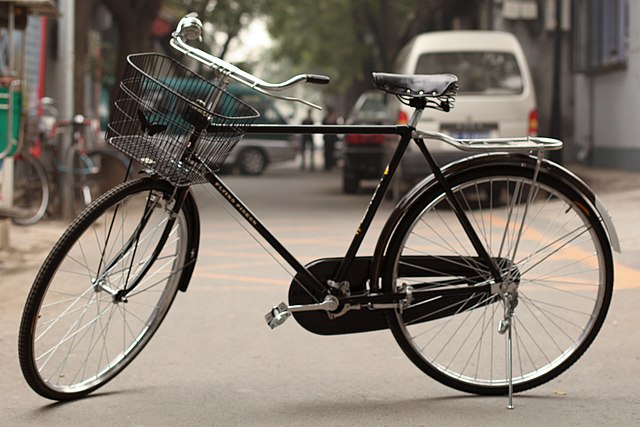A bike. Etymology 1
From bicycle
One explanation for the pronunciation is that bicycle is parsed to bi(cy)c(le). An alternative explanation is that bicycle is shortened to bic(ycle), and the terminal [s] is converted to a [k] because there is an underlying underspecified [k]/[s] sound, which is softened to [s] in bicycle but retained as [k] in bike ; compare the letter ‘c’ (used for [k]/[s]).[1]
Noun
bike (plural bikes
Clipping of bicycle .
Clipping of motorbike .
( slang , derogatory ) Ellipsis of village bike .
Synonyms: slapper slag Translations
bicycle
Armenian: հեծանիվ (hy) ( hecaniv ) , ( colloquial ) հեծո ( heco )
Basque: bizikleta (eu)
Bengali: ঠেংগাড়ী (bn) ( ṭheṅgaṛi )
Catalan: bici (ca) f
Cornish: diwros f
Czech: kolo (cs) n
Danish: cykel (da) c
Dutch: fiets (nl) m velo (nl) m ( slang, Belgium )
Estonian: jalgratas (et)
Farefare: kut-weefo kutuyeho
Finnish: pyörä (fi) fillari (fi) polkupyörä (fi)
French: vélo (fr) m
Galician: bici (gl) f
Georgian: ველოსიპედი ( velosiṗedi )
German: Fahrrad (de) n Rad (de) n Velo (de) n ( Switzerland ) , Drahtesel (de) ( colloquial )
Alemannic German: Velo
Greek: ποδήλατο (el) ( podílato )
Hungarian: bicaj (hu) ( slang ) , bicó ( slang ) , bringa (hu) ( slang ) , bicikli (hu)
Icelandic: reiðhjól (is) n
Indonesian: sepeda (id)
Italian: bici (it) f ( slang )
Japanese: 自転車 (ja) ( じてんしゃ , jitensha) , チャリンコ (ja) ( charinko ) ( slang ) , チャリ (ja) ( chari ) ( slang ) , ケッタ ( ketta ) ( slang, dialectal )
Khmer: កង់ (km) ( kɑng ) , រទេះកង់ ( rɔteh kɑng )
Korean: 자전거 (ko) ( jajeon'geo )
Kyrgyz: чалынгыч ( calıngıc )
Lao: ລົດຖີບ (lo) ( lot thīp )
Lithuanian: dviratis m
Luxembourgish: Vëlo (lb) m
Moore: kut weefo kut-weefo
Norwegian: sykkel (no) m
Odia: ସାଇକେଲ ( sāikela )
Persian: دوچرخه (fa) ( dočarxe )
Polish: rower (pl) m
Portuguese: bici (pt) f bicicleta (pt) f bicla (pt) f
Romanian: bicicletă (ro) f
Russian: велосипе́д (ru) ( velosipéd ) , ( colloquial ) ве́лик (ru) ( vélik )
Scottish Gaelic: baic m bàic m
Serbo-Croatian: bicikl (sh)
Sindhi: سائيڪل
Slovak: bicykel (sk) m
Slovene: kolo (sl) n
Spanish: bici (es) f
Swedish: cykel (sv) c
Tagalog: bisikleta
Thai: จักรยาน (th) ( jàk-grà-yaan )
Turkish: bisiklet (tr) derrace (tr) çalınga velespit (tr)
Ukrainian: велосипед (uk) ( velosyped )
Vietnamese: xe đạp (vi)
Volapük: saikul (vo)
Welsh: beic (cy) m
West Frisian: fyts (fy)
Yiddish: ביציקל m ( bitsikl ) , ראָווער m ( rover ) , וועלאָסיפּעד m ( velosiped ) , ביציקלעט m ( bitsiklet )
motorcycle
Armenian: մոտոցիկլետ (hy) ( motocʻiklet ) , ( colloquial ) մոտո (hy) ( moto )
Catalan: moto (ca) f
Chinese:
Dungan: мотуәчә ( motuəčə )
Czech: motorka (cs) f
Danish: motorcykel (da) c
Dutch: motorfiets (nl) brommer (nl)
Estonian: mootorratas
Finnish: prätkä (fi) fillari (fi) moottoripyörä (fi)
French: moto (fr) f
Galician: moto (gl) f
Georgian: მოტოციკლეტი ( moṭociḳleṭi )
German: Motorrad (de) n Moped (de) n
Greek: μοτοσυκλέτα (el) f ( motosykléta ) , μηχανή (el) f ( michaní ) , μηχανάκι (el) n ( michanáki )
Hungarian: motor (hu) motorkerékpár (hu) moci (hu) ( slang )
Indonesian: sepeda motor (id)
Italian: moto (it) f
Japanese: バイク (ja) ( baiku )
Khmer: ម៉ូតូ ( moutou )
Lao: ລົດຈັກ (lo) ( lot chak ) , ຣົຖຈັກ ( rot chak )
Malagasy: môtô (mg)
Norwegian: motorsykkel m
Odia: ମଟର ସାଇକେଲ ( maṭara sāikela )
Polish: motocykl (pl) m
Portuguese: mota (pt) f moto (pt) f
Punjabi: ਮੋਟਰਸਾਈਕਲ ( moṭrasāīkal ) , ਬਾਈਕ ( bāīka ) , ਮੋਟਰਬਾਈਕ ( moṭrabāīka )
Russian: мотоци́кл (ru) m ( motocíkl )
Scottish Gaelic: bàic m
Sindhi: موٽر سائيڪل
Sinhalese: යතුරුපැදිය ( yaturupædiya )
Slovak: motorka f
Slovene: motorno kolo n
Spanish: moto (es) f
Swedish: mc (sv) c MC (sv) c motorcykel (sv) c båge (sv) c ( slang )
Thai: มอเตอร์ไซค์ (th) ( mɔɔ-dtəə-sai )
Vietnamese: xe máy (vi) xe gắn máy (vi)
Volapük: motorasaikul
Welsh: beic modur (cy) m
Verb
bike (third-person singular simple present bikes present participle biking simple past and past participle biked
( intransitive ) I biked so much yesterday that I'm very sore today.
( intransitive ) It was such a nice day I decided to bike to the store, though it's far enough I usually take my car.
( transitive ) transport by bicycle.
I biked them the letters.
2020 September 1, Tom Lamont, “The butcher's shop that lasted 300 years (give or take)”, in The Guardian Frank, a teenager, arrived at his grandfather’s shop to begin work as a butcher’s boy. The job would be to bike parcels of meat around Dronfield and the surrounding countryside between the cities of Sheffield and Chesterfield, right on the county border of Derbyshire and Yorkshire.
Translations
Translations to be checked : "to bike"
Etymology 2
From Middle English bike byke ( “ a nest of wild bees or wasps; also, ” ) , of unknown origin. Perhaps a back-formation of Middle English * bykere ( “ beekeeper ” ) , from Old English bēocere ( “ beekeeper ” ) ; or from Old English * bȳcOld English būc ( “ belly; vessel; container ” ) . Compare also Scots byke ( “ beehive, anthill; home, dwelling ” ) , Old Norse bý ( “ bee ” ) .
Noun
bike (plural bikes
( Scotland , Northern England ) hive of bees , or a nest of wasps , hornets , or ants .
1955 Robin Jenkins , The Cone-Gatherers , Canongate, published 2012 , page 107 :he stood for a minute talking to them about their job of gathering cones, and telling them a story about a tree he’d once climbed which had a wasp’s byke in it unbeknown to him.
( chiefly Scotland , by extension, collective ) 